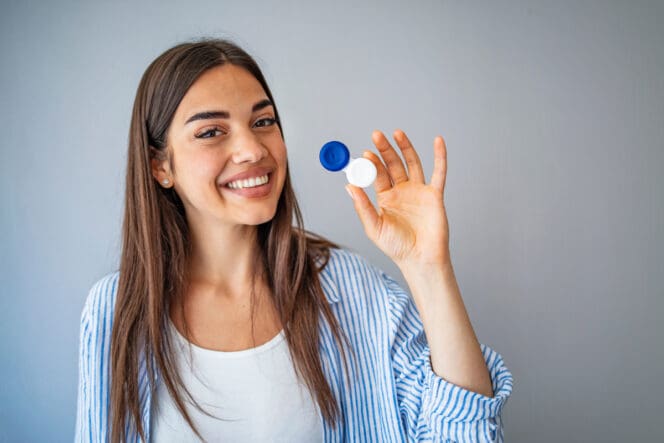Contact lenses are often recommended for people with astigmatism. Wearing them could give you the clear vision you want.

Astigmatism is a vision impairment that occurs because of an abnormal shape of the cornea or lens. These parts of your eye can’t focus light precisely on the retina. Consequently, you experience blurry vision due to refractive errors.
Contacts could solve this issue. In fact, some types of contacts are made just for people with astigmatism.
Is It Safe to Wear Contacts With Astigmatism?
If you care for your contacts properly, it’s perfectly safe to wear them with astigmatism.
Safe contact lens care involves the following steps:
- Wash your hands. Don’t touch your eyes or your contacts without scrubbing up first.
- Take them out. Don’t wear your contacts longer than your doctor recommends.
- Disinfect and store them. Follow your doctor’s rules about cleaning and storing your contacts. Don’t take shortcuts.
- Play it safe around water. Don’t wear your contacts while you’re showering, swimming, bathing, or sitting in a hot tub.
If you follow these rules carefully and listen to your doctor’s recommendations, you can wear contact lenses on eyes with astigmatism.
Why Contact Lenses Are Good Choices for Astigmatism
Astigmatism causes you to see distorted images, whether near or far. Fortunately, you can overcome the problem using eyeglasses or contact lenses. In fact, contact lenses offer benefits for astigmatism that glasses can’t touch.
Hard contact lenses sit on the surface of the eye, applying gentle pressure. That firm shape can correct the eye’s imperfections, allowing for sharper vision in eyes with astigmatism.
What Types of Contacts Are Recommended for Astigmatism?
The American Academy of Ophthalmology (AAO) says that rigid gas-permeable contact lenses (RGPs) are best for people with astigmatism. These lenses are firm, and they stay put to offer crisp vision on an uneven eye.
While RGPs may offer the best route to clear vision, they can be hard to adjust to. You may feel them on your eye, especially when you blink. And you can’t keep them on for long periods, as you can with soft contacts.
AAO says more significant forms of astigmatism may benefit from toric contact lenses. These products are weighted, and they offer slightly different fields of vision scattered throughout them. You could see better both near and far with these contacts.
Best Contact Lenses for Astigmatism
The best contact lenses are ones that fit your eyes so well that you’re willing to wear them as directed. These are products people with astigmatism often use.
Acuvue Oasys 1-Day with HydraLuxe for Astigmatism
These are single-use lenses. You must replace them daily, which removes any concerns about cleaning, contact lens solution, and cases.
The use of a HydraLuxe wetting agent increases the likelihood that the lenses won’t irritate the eyes. Tears wet the lens the same way they do your eyes. Therefore, these are good daily lenses for those with dry eyes.
In addition, Acuvue Oasys 1-day lenses provide UV protection to your eyes. You can buy either a 30-day or a 90-day pack. A box of 30 lenses costs about $48.
Acuvue Oasys for Astigmatism Hydraclear Plus
If you want lenses that last longer than a day, consider Acuvue Oasys for Astigmatism Hydraclear Plus. These lenses last a week or two.
The Hydraclear plus technology helps keep the lens wet, promoting comfort while wearing them. You also get high UV protection from these lenses. A box containing six lenses costs about $54.
Bausch & Lomb ULTRA for Astigmatism
If you want longer-lasting lenses, you might like Bausch & Lomb ULTRA for Astigmatism. These lenses can last for a month without replacement.
They use moisture seal technology, which retains 95% of lens moisture. This technology helps to prevent dry eyes from infrequent blinking when using a computer screen. Also, they have an optic align design that promotes consistent, clear vision all day.
Proclear Toric
The Proclear Toric lens requires replacement once a month. If you experience irritation and dry eyes from wearing a contact lens, the Proclear Toric may be a good choice for you.
The lens uses PC technology that binds water to the lens. This technology helps to keep the lens fresh all day.
Bausch + Lomb Ultra Multifocal for Astigmatism
The Bausch + Lomb Ultra Multifocal for Astigmatism lenses are ideal for people with presbyopia (farsightedness) and astigmatism.
These lenses have three zones that help to provide sharp vision from all distances. This unique design can be helpful, especially when driving at night. They also have moisture-seal technology that locks in moisture for 16 hours.
Contact Alternatives for Astigmatism
People with mild cases of astigmatism may not need treatment. Eyeglasses and contact lenses are the most common treatment methods for more severe cases.
Your doctor may also recommend surgery to correct astigmatism. Surgery can change the cornea’s shape to allow it to focus light more accurately.
FAQs About the Best Contact Lenses for Astigmatism
Hard contact lenses tend to work better than soft versions, per AAO. But if your astigmatism is severe, you may benefit from specialized toric lenses.
It depends. Your doctor can help you choose the contact lenses that are right for you.
It depends. Most people with astigmatism benefit from hard contact lenses. Some are made for extended wear, but others are not. Your doctor can help you choose the type that’s best for you.
References
-
Contact Lenses. (July 2019). National Eye Institute.
-
Contact Lenses for Vision Correction. (May 2023). American Academy of Ophthalmology.
-
Which Is Better for Astigmatism: Glasses or Contacts? (June 8, 2023). American Academy of Ophthalmology.
-
Contact Lens Types. (January 2022). Centers for Disease Control and Prevention.
Last Updated October 6, 2023
Note: This page should not serve as a substitute for professional medical advice from a doctor or specialist. Please review our about page for more information.